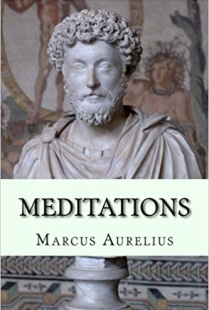Download into any device (smartphones, tablets and dedicated readers).

Other Items by Marcus Aurelius
Meditations
Overview
Product Details
Meet the Author
Marcus Aurelius Latin: Marcus Aurelius Antoninus Augustus; 26 April 121 – 17 March 180), called the Philosopher, was a Roman emperor (ruling from 161 to 180) and Stoic philosopher. Marcus was the last of the rulers traditionally known as the Five Good Emperors. He is also seen as the last emperor of the Pax Romana, an age of relative peace and stability for the Roman Empire. His personal philosophical writings, now commonly known as Meditations, are a significant source of the modern understanding of ancient Stoic philosophy. They have been praised by fellow writers, philosophers, and monarchs – as well as by poets and politicians – centuries after his death.
Marcus was born to Marcus Annius Verus, a praetor and the great-great-nephew of Emperor Trajan, and Domitia Lucilla, a wealthy noblewoman and heiress. After Marcus' father died in 124, his paternal grandfather raised him. He was educated at home, as children from Roman aristocratic families often were, and later credited his maternal step-great-grandfather Lucius Catilius Severus – who helped Marcus' grandfather to raise him – for his education. His tutors included the artist Diognetus, who may have sparked his interest in philosophy, and Tuticius Proclus. Marcus was betrothed to the daughter of Lucius Aelius, his relative Emperor Hadrian's first adopted son and heir. Aelius died in 138 and Hadrian chose as his new heir Antoninus Pius, the husband of Marcus' aunt, on the condition that Antoninus adopt Marcus and the son of Aelius, Lucius Commodus. Antoninus became emperor later that year upon Hadrian's death, and Marcus and Lucius became joint heirs to the throne. While imperial heir, Marcus studied Greek and Latin. His tutors included Herodes Atticus and Marcus Cornelius Fronto. He kept in close correspondence with Fronto for many years afterwards. Marcus was introduced to Stoicism by Quintus Junius Rusticus and perhaps by other philosophers such as Apollonius of Chalcedon. He was appointed as a quaestor, as the symbolic head of the equites (a social class), and three times as consul: with Antoninus in 140 and 145 and with Lucius in 161. On 7 March 161, Antoninus died; Marcus and Lucius succeeded to the throne.
Marcus' reign was marked by military conflict. In the East, the Roman Empire fought successfully with a revitalized Parthian Empire and the rebel Kingdom of Armenia. Marcus defeated the Marcomanni, Quadi, and Sarmatians in the Marcomannic Wars. However, these and other Germanic peoples began to represent a troubling reality for the Empire. Marcus modified the silver purity of the Roman currency, the denarius. Persecution of Christians is believed to have increased during his reign. The Antonine Plague that broke out in 165 or 166 devastated the population of the Roman Empire. It caused the deaths of five million people, a quarter of those it affected. Marcus never adopted an heir unlike some of his predecessors; he and his cousin-wife (Antoninus' daughter) Faustina, whom he married in 145, had at least thirteen children including Lucilla – who married Lucius Verus – and Commodus – whom Marcus named as his co-ruler in 177. Marcus became the first emperor to die with a living biological adult son since Titus succeeded his father Vespasian a century earlier, but Commodus is considered a disappointment as emperor and his succession has long been the subject of debate among both contemporary and modern historians. The Column and Equestrian Statue of Marcus Aurelius still stand in Rome, where they were erected in celebration of Marcus' military victories.





Customer Reviews